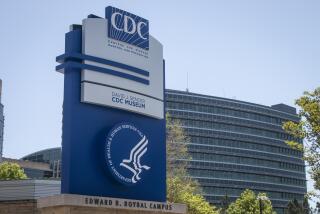L.A. Health Agency’s Deficit Up
- Share via
Adding to the county health department’s financial woes, a state audit has found that it has underestimated its looming shortfall by $170 million.
In a report released Thursday, state auditor Elaine M. Howle said Los Angeles County will be more than $850 million short by 2005-06, a sum so substantial that if the department does not convince the state and federal governments to contribute more money, it will have to fundamentally redefine what services it provides.
The bulk of the projected deficit is caused by the end of a federal bailout, which would leave the department $688 million in the red. But even that figure, previously released by county officials, overestimates revenues and underestimates expenses, the report said. It does not include the effect of regulatory changes that will reduce federal reimbursement limits and require higher nurse-to-patient ratios and seismic retrofitting of hospitals, among other things.
“There has to be a change in the government funding or they’re going to have to cut back services,” said Ann Campbell, the principal auditor for the report.
The county’s health director, Dr. Thomas Garthwaite, said that the report is “reasonably accurate” and that the department knew about the additional financial problems. County administrator David Janssen said the deficit projections purposefully did not include the impact of the new regulatory changes while they were tentative.
“We don’t have enough money into the future to give the level of services we have,” he said. “Anything that deepens the deficit is discouraging.”
Next month, Garthwaite will present recommendations to the county Board of Supervisors on how to fix his department’s financial problems.
He agreed with the state auditor’s assessment that any solution goes far beyond simple cost-cutting measures to a fundamental shift away from the county’s hospital-based model to cheaper outpatient services.
“As I look at the redesigned system and I try to add up what the redesigned system would save, I don’t come near $688 million,” Garthwaite said. “I have to close down a few things to get to $100 million.
“To get to the real money,” he added, “we have to cut pretty deep.”
The department has socked away $500 million in reserves, which could allow it to delay the crisis for a couple of years, but county officials say they are committed to beginning reforms now.
Proposals under review run the gamut from closing hospitals to turning some hospitals into clinics and reducing beds in others.
The solution depends, in part, on whether Garthwaite and the Board of Supervisors can convince state and federal officials to again rescue the county’s health system, which serves nearly 3 million uninsured residents with a $4.7-billion budget.
The federal government has already bailed out the county health department twice with billion-dollar waivers to Medicaid rules that allowed the county to bill Washington more for outpatient services.
The last waiver in 2000 was meant to be just that--a five-year weaning plan that drops to zero in 2005-06.
Garthwaite said that the county is not asking for money this time--just “flexibility.” He and county supervisors are lobbying for reform by removing profit incentives for expensive hospital care and replacing them with incentives for currently unprofitable preventive care.
He said state and federal officials have been willing to listen to the county’s proposals.
But the state has a $22-billion deficit of its own and the federal government not only is under a new administration but also has its own fiscal woes, increasing the likelihood that the county will have to save itself this time.
In some ways, the state auditor’s report was positive.
It said that the county hospital system is reasonably efficient--about average when compared with its peers--and that the health department has a fairly reliable system for assessing its financial situation, although some of its internal projections were not realistic.
“In general, we found that Health Services has done a reasonable job of controlling its costs and that it has been innovative in finding new state and federal sources of revenue,” the report states.
The audit was ordered by the Legislature in 2001 to independently assess the department’s financial dilemma and determine whether it had a handle on how to solve it.
What it found, according to chief deputy state auditor Steve Hendrickson, is that “they’ve still got some solving to do.”
More to Read
Sign up for Essential California
The most important California stories and recommendations in your inbox every morning.
You may occasionally receive promotional content from the Los Angeles Times.










